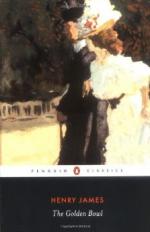on the creature’s part, that was to have even,
for the short interval, its impressive beauty, but
of which the limit, and in yet another direction, had
loomed straight into view during her last talk under
the great trees with her father. It was when
she saw his wife’s face ruefully attached to
the quarter to which, in the course of their session,
he had so significantly addressed his own—it
was then that Maggie could watch for its turning pale,
it was then she seemed to know what she had meant
by thinking of her, in she shadow of his most ominous
reference, as “doomed.” If, as I say,
her attention now, day after day, so circled and hovered,
it found itself arrested for certain passages during
which she absolutely looked with Charlotte’s
grave eyes. What she unfailingly made out through
them was the figure of a little quiet gentleman who
mostly wore, as he moved, alone, across the field
of vision, a straw hat, a white waistcoat and a blue
necktie, keeping a cigar in his teeth and his hands
in his pockets, and who, oftener than not, presented
a somewhat meditative back while he slowly measured
the perspectives of the park and broodingly counted
(it might have appeared) his steps. There were
hours of intensity, for a week or two, when it was
for all the world as if she had guardedly tracked
her stepmother, in the great house, from room to room
and from window to window, only to see her, here and
there and everywhere, try her uneasy outlook,
question her issue and her fate. Something, unmistakably,
had come up for her that had never come up before;
it represented a new complication and had begotten
a new anxiety—things, these, that she carried
about with her done up in the napkin of her lover’s
accepted rebuke, while she vainly hunted for some
corner where she might put them safely down. The
disguised solemnity, the prolonged futility of her
search might have been grotesque to a more ironic
eye; but Maggie’s provision of irony, which
we have taken for naturally small, had never been
so scant as now, and there were moments while she watched
with her, thus unseen, when the mere effect of being
near her was to feel her own heart in her throat,
was to be almost moved to saying to her: “Hold
on tight, my poor dear—without too
much terror—and it will all come out
somehow.”
Even to that indeed, she could reflect, Charlotte might have replied that it was easy to say; even to that no great meaning could attach so long as the little meditative man in the straw hat kept coming into view with his indescribable air of weaving his spell, weaving it off there by himself. In whatever quarter of the horizon the appearances were scanned he was to be noticed as absorbed in this occupation; and Maggie was to become aware of two or three extraordinary occasions of receiving from him the hint that he measured the impression he produced. It was not really till after their recent long talk in the park that she knew how deeply, how quite exhaustively, they




